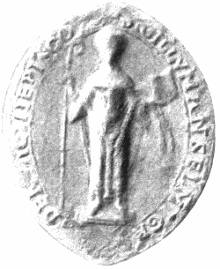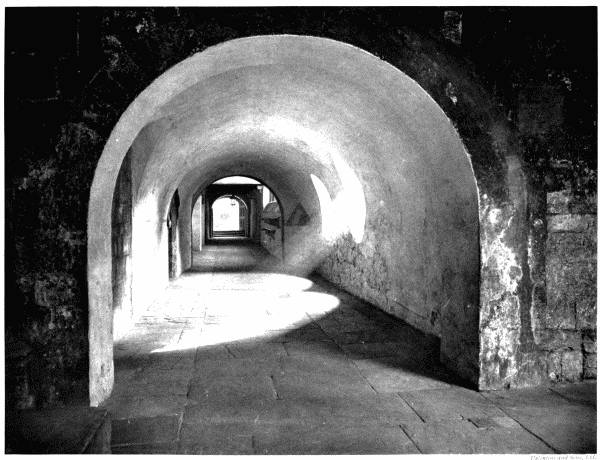

Search london history from Roman times to modern day
275
NORMAN LONDON
William Rufus was killed on Thursday, August 2, 1100, and buried on Friday. Henry rode off to London without the least delay: he arrived on Saturday; conferred with the leading citizens on the same day, and was actually crowned at Westminster on Sunday. Haste such as this shows not only his desire to get crowned before his elder brother could interfere, but points to the danger to the realm if the throne were vacant even for a single day. J. R. Green, in a paper on the election of Stephen, dwells upon the importance and the power of the citizens of London, who could thus of their own authority elect and crown a king. But, in fact, the City only repeated in the case of Stephen their action in the case of Henry. The latter rode at headlong speed from the New Forest to London—he must have ridden night and day. To be sure, it was the height of summer, when the roads were dry and hard. He presented himself before the Bishop and Portreeve and the notables of London. “Make me your king,” he said. “In return I will give you what you most desire, peace and order. I will do more. I will marry Maude, daughter of Malcolm, King of Scots, and of Margaret, sister of Edgar, heiress of the line of Alfred, and will make the crown secure and the country free from civil war.” They agreed. It is generally believed that the citizens made a bargain with Henry for new privileges. What they wanted most was a strong king, who would make peace and keep it; enforce his laws; put down highway robbery and oppression and piracy, and make trade possible. There was not much thought of new privileges, but first and foremost—of order. Anselm, Archbishop of Canterbury, was absent. The King was crowned by Maurice, Bishop of London, who had the greatest share276 in his election. Three months later the King’s wife, Maude, the Saxon heiress, was also crowned in the Abbey, and feasted in the Red King’s Hall, to the unspeakable joy of the whole country.
It has generally been stated that Henry bestowed upon the City the famous Charter, by which their liberties were greatly widened, in the very first year of his reign, as a reward for their support and election. There are, however, strong reasons for believing that at the beginning of his reign he confined himself to promises or to a confirmation of his father’s Charter, and that the document known as his Charter was granted in reality in the year 1130, five years before his death. What the City obtained from Henry was a time of peace: when criminals had no mercy to expect; when a man might drive his caravan of pack-horses from fair to fair without fear of robbers; and the King acted up to his promise that none should do his people wrong. That he was an expensive king: that he demanded money without end or stint, was pardoned in return for the priceless boon of peace and order.

I have thought it best to consider Henry’s Charter in a separate chapter, clause by clause, in connection with the gradual rise of the power of the Londoners, as is fitting for the most important of all the Charters by which London rose to liberty and greatness. It will suffice here to indicate generally the nature of the Charter by quoting the words of Bishop Stubbs, Constitutional History, p. 439:—
“The Charter of Henry I. shows a marked advance. The City is recognised as a distinct unity, although that unity depends on hereditary succession only: it is independent of county organisation, the county in which it lies is itself let at ferm to the citizens; it is placed on a level with the shires, it is to have a sheriff of its own and a justiciar: as a greater privilege still, it is to elect its own sheriff and justiciar, and to be open to no other jurisdiction than that of its own elected officers. The citizens are not to be called before any court outside their own walls, and are freed from Danegeld, from scot and lot, from responsibility from the murder-fine and obligation to trial by battle: they are freed from toll and other duties of the kind throughout all England, at the ports as well as inland. They are to possess their lands, the common lands of their township, and their rights of coursing in Chiltern, Middlesex, and Surrey. Yet with all this no new incorporation is bestowed: the churches, the barons, the citizens, retain their ancient customs; the churches their sokens, the barons their manors, the citizens their township organisation, and possibly their guilds.”
In the year 1125 there was done a deed of justice grim and terrible: one which caused the ears of all who heard it to tingle. One does not know how far London was concerned with it. But that there were “moneyers” or minters in London is certain. Three, viz. Achard, Lefwin Besant, and Ailwin Finch, were moneyers of London in 1149. And nothing is said as to any exception in favour of London. There had been grave and universal complaints about the coinage, which was debased by those who struck it. Henry considered the subject, he doubtless tested the coins; he made up his mind that all were guilty, and thereupon “commanded that all the minters in England should be deprived of their right hands and should be277 also, in another well-known manner, mutilated. And this “because a man may have a pound and yet not be able to spend a penny in the market.” He means that the pound might consist of debased money. Accordingly, Roger, Bishop of Salisbury, sent over all England, and invited every minter to come to Winchester at Christmas, without letting any one know what awaited him: and when they obediently journeyed thither, thinking probably they were to receive some new privilege, his men took them one by one, cut off their right hands and deprived them of their manhood. “All this was done within twelve days, and with much justice, because they had ruined this land with the great quantity of bad metal they had all corrupted.” A strong king, truly! One can imagine the discourse of the unhappy minters on the way. Some signal mark of the King’s favour was coming, some promotion from the Bishop, larger powers, greater profits. The Bishop said never a word of his purpose; he received them courteously; he invited them as to a feast; and then, one by one—Alas! Poor Minters! Never more did they debase the coinage. This summary and terrible act of justice, if it included London, must have fallen upon some of the most eminent merchants in the City: not, one hopes, upon Orgar the Proud, of whom we hear more in connection with deeds and documents of the time and as one of the notables of the City.
In the year 1126 a famine fell upon the land.
In 1132 a fire which began at the house of Gilbert Becket in West Chepe destroyed the greater part of the north-east quarter of London.
During this reign the Priory of the Holy Trinity, that of St. Mary Overies, and the Priory and Hospital of St. Bartholomew were founded. It is generally asserted that the Benedictine Nunnery of Clerkenwell was founded by one Jordan Briset in 1100, but Mr. H. J. Round has now proved that both this nunnery and the Priory of St. John were founded about the year 1145. Queen Maude also founded the Lazar-House of St. Giles in the Fields. (See Mediæval London, vol. ii. p. 311.)
There were grave complaints by ecclesiastics against the luxury and effeminacy of the age—but every age has its complaints of luxury. Young men wore their hair as long as women. They also dressed with as much splendour and attention as women; they crowned themselves with wreaths of flowers. Despite the revival of religion, the corruption of morals attributed to William Rufus was continued under his successor: the King himself was notorious for his amours and infidelities. He was led to repentance in his old age by one of those dreams which fill up a good part of the Chronicles. In this dream he saw pass before him a procession. First marched the ploughmen with their tools; next, the craftsmen with theirs; then came the soldiers bearing arms, and with them the Barons and Knights. Last of all came the clergy with their Bishops. But the latter were armed with their croziers, and they ran upon the King as if they would kill him with these hallowed weapons. The dreamer sprang out of bed and seized his sword to defend himself. When he awoke,278 behold! it was a dream. But the terror remained, and Henry set himself to repentance and amendment. No doubt he remembered how a dream of warning had been sent to his brother, by neglect of which he came to his untimely end.
The importance of this reign to the City of London lies mainly in the Charter which we are about to discuss: we must not, however, forget the order which Henry I. established and maintained in every part of his kingdom. This order was especially valued in a place like London, which could only carry on its trade in security when order was maintained. And though London contained so many citizens of Norman birth and descent, the great mass of the people were English, and could not fail to be pleased when Henry showed that he threw himself upon the support of his English subjects, when he married an English wife, and restored through her the line of Alfred to the throne. A great king, a strong king, a just king. What more could the times desire?
And Last updated on: Thursday, 02-Jan-2025 22:03:45 GMTTrying to avoid privacy and cookie settings overwriting content